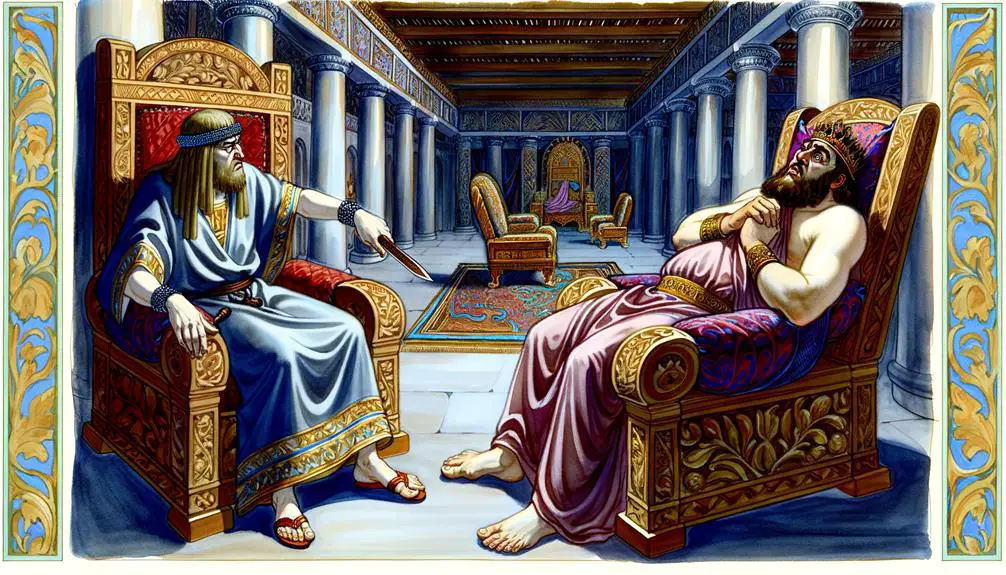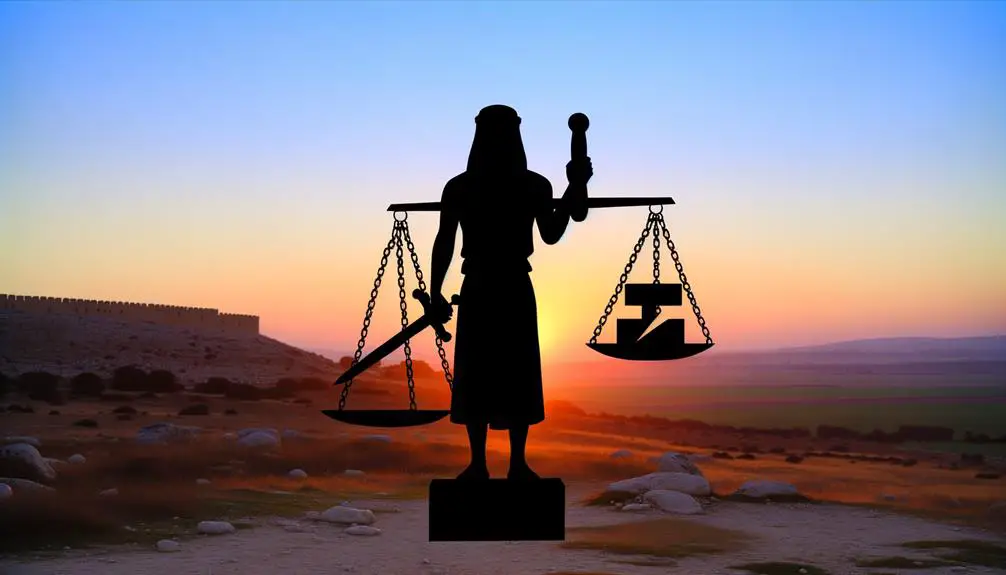The tale of Ehud, a left-handed hero, unveils a cunning assassination that reshaped Israel's fate—discover how.

Ehud in the Bible
In the turbulent era of the Judges, you'll find Ehud, a left-handed Israelite from the tribe of Benjamin, featured prominently. His strategic assassination of Moabite King Eglon exploited cultural biases toward right-handedness, allowing him to conceal a weapon on his atypical side. This act not only demonstrated tactical ingenuity but also divine sanction, leading to 80 years of subsequent peace in Israel. Ehud's story underscores themes of justice and deliverance, unfolding in an unpredictable geopolitical landscape where alliances and local leadership greatly influenced military outcomes. Understanding the full implications of his actions offers deeper insights into Biblical narratives and their lessons.
Key Takeaways
- Ehud was a judge from the tribe of Benjamin who assassinated Moabite King Eglon.
- He was left-handed, which he used to his tactical advantage during the assassination.
- Ehud concealed a double-edged dagger on his right thigh, subverting security expectations.
- His assassination led to 80 years of peace and stability in Israel.
- Ehud's story highlights themes of divine justice and deliverance in biblical history.
Ehud's Historical Context

When examining Ehud's role, it is imperative to grasp that he arose during the tumultuous era of the Judges, a time characterized by decentralized leadership and frequent conflicts with neighboring tribes. To understand his context fully, you need to take into account the broader spectrum of Bronze Age politics. This period was marked by the emergence of various city-states and a complex network of regional alliances. These alliances were often forged and broken as power dynamics shifted rapidly among the tribes and their neighbors.
Ehud's era, specifically, was one of those times when the political landscape was particularly volatile. The regional alliances weren't just diplomatic but also tactical, influencing military strategies and territorial control. These alliances would have played a pivotal role in how leaders like Ehud navigated their interactions with other groups, including oppressors or rival tribes. The fluidity of these relationships, dictated by the ever-changing power equations, would have been a critical element in understanding the strategies employed by Ehud and his contemporaries. Analyzing these dynamics offers you a clearer lens through which to view the challenges and the political acumen required to lead and protect a tribe in such fragmented times.
The Story of Ehud
Delving into the narrative of Ehud, one finds a story of cunning and bravery that highlights the intricate dynamics of leadership and subversion during the Judges period. As you explore this account, it's imperative to ponder Ehud's lineage and the significant religious implications of his actions. Ehud, a member of the tribe of Benjamin, was not just a deliverer; his ancestry played a pivotal role in shaping his destiny and approach to leadership within the Israelite community.
The religious implications of Ehud's mission are profound. His assassination of Moab's king Eglon was not merely a political maneuver but a divinely sanctioned act aimed at liberating the Israelites from Moabite oppression. This narrative underscores the theme of divine intervention and justice, which are recurrent in the Book of Judges.
To further understand Ehud's strategy and its impact, reflect on these aspects:
- *Ehud's discreet approach to King Eglon under the guise of a tribute presentation.*
- *The significance of Ehud's message from God to Eglon, indicating divine approval.*
- *The strategic use of a double-edged dagger, symbolizing the dual nature of justice and deception.*
- *Ehud's escape through the porch, illustrating his tactical foresight.*
- *The rallying of the Israelites post-assassination, highlighting Ehud's leadership and inspirational qualities.*
Each element of Ehud's story contributes to a deeper understanding of his character and the religious undertones of his actions.
Ehud's Left-Handed Advantage

Reflecting on Ehud's tactical acumen, it's notable that his left-handedness provided a distinct advantage in executing his mission effectively. In ancient societies, including Israel and its surrounding regions, right-handedness was overwhelmingly the norm; therefore, cultural perceptions and handedness stereotypes strongly favored the right hand for daily activities and combat. This societal preference often led to underestimating left-handed individuals, a factor that Ehud turned to his strategic benefit.
Historically, warriors trained primarily to combat right-handed opponents, orienting their defensive techniques and positioning to anticipate blows from a right-handed angle. Ehud's left-handedness would have disrupted these conventional expectations, giving him an unforeseen edge. His approach to combat would not only have been unanticipated but potentially confusing for his adversaries, who were less practiced in guarding against attacks from the left side.
Moreover, archaeological and textual evidence from the period suggest that guards and officials may have been less vigilant towards left-sided threats, focusing security measures and weapon checks more rigorously on the right. This oversight highlights how deeply ingrained handedness stereotypes were, and how such cultural perceptions could be exploited. Ehud's story, thus, underscores an intriguing intersection of physical uniqueness and tactical innovation within biblical narratives.
The Assassination of King Eglon
You must consider Ehud's cunning approach as the key element in the assassination of King Eglon. This strategic maneuver exploited Eglon's vulnerable moment during their private meeting, allowing Ehud to execute his plan with precision. The aftermath of the assassination catalyzed significant changes, influencing both immediate political structures and broader historical narratives.
Ehud's Cunning Approach
Ehud's assassination of King Eglon demonstrates a masterful blend of cunning and bravery, strategically leveraging his left-handedness to conceal a weapon. Employing stealth tactics, Ehud manipulated perceptions, an essential aspect of deceptive diplomacy, to access the king safely. His approach wasn't merely about physical strength but also about psychological maneuvering and exploiting Eglon's expectations.
- Unexpected Weapon Placement: Utilizing his less-suspected left side to hide the dagger.
- Deceptive Diplomacy: Feigning peace to lower Eglon's defenses.
- Strategic Misdirection: Presenting a tribute to distract.
- Psychological Advantage: Capitalizing on stereotypes of disability.
- Careful Planning: Choosing the right moment when suspicion was least.
Each element was pivotal in the success of Ehud's daring mission, highlighting his profound understanding of both human nature and tactical warfare.
Eglon's Vulnerable Moment
At the heart of King Eglon's assassination was his unguarded moment during a private audience with Ehud, which revealed significant lapses in royal security protocols. You'd note that the typical rigors of palace intrigue often necessitate stringent security measures, particularly during private meetings where the risk of treachery would be high. However, in this instance, the breakdown in safeguarding the king during such an essential interaction was glaring. This lapse was not just a failure of the guards to detect threats but also highlighted a possible underestimation of internal threats within the royal court. The fact that Ehud, a left-handed man, could smuggle a weapon into Eglon's presence underscores a critical oversight in the security framework, exploiting the blind spots of traditional scrutiny methods.
Aftermath of Assassination
The assassination of King Eglon by Ehud set off a chain of consequential events that reshaped the political landscape of the region. You're looking at a period marked by immediate political instability as power vacuums often invite conflict and uncertainty. Regional reactions varied, with neighboring states and tribes watching closely, recalibrating alliances and strategies in response to this sudden shift.
Here are some key consequences:
- Emergence of local power struggles
- Reevaluation of treaties and alliances
- Increase in military skirmishes at borders
- Economic disruptions due to unstable leadership
- Rise in revolutionary sentiments among oppressed groups
Each of these points underscores the complex ripple effects triggered by a single act of assassination, illustrating how deeply intertwined politics and security can be.
Aftermath and Israel's Peace
Following Ehud's assassination of King Eglon, Israel enjoyed eighty years of peace, a period marked by significant socio-political stability and absence of major conflicts. The peace duration not only highlights the effectiveness of Ehud's decisive action but also reflects the socio-political fabric of Israel during this era. During these years, societal reactions seemed to pivot towards a collective sigh of relief, as the populace embraced a life devoid of oppressive foreign rule, which had stifled their economic and cultural expressions.
This extensive period of peace allowed for agricultural advancements and trade improvements, which contributed to a gradual increase in wealth and a decrease in poverty levels. The elimination of Moabite interference catalyzed a renaissance of local governance structures and the re-establishment of tribal leadership roles that had been suppressed under King Eglon's regime. The societal structure reoriented itself, favoring a decentralized form of governance that likely prevented the rise of another singular oppressive ruler.
Analyzing these developments, it is evident that the long peace had profound implications on Israel's internal dynamics. It facilitated not only a return to traditional socio-political norms but also an introspective look at governance that prioritized local leadership and community-based decision-making processes.
Themes of Justice and Deliverance

Ehud's story exemplifies a compelling narrative of justice and deliverance, demonstrating how individual actions can reshape societal norms and restore balance. In the context of ancient Israel, Ehud's assassination of Moabite king Eglon not only represents an act of divine intervention but also highlights the moral ambiguity surrounding his methods. This dichotomy invites you to explore deeper themes of justice as envisioned within the biblical narrative.
- Divine Mandate: Ehud is portrayed as an instrument of divine justice, suggesting that his actions, while violent, are ultimately part of a larger, divinely ordained plan.
- Moral Ambiguity: The method of delivering justice—through deception and assassination—raises questions about the ethics of Ehud's actions and the biblical perspective on morality.
- Deliverance as Liberation: Ehud's actions lead directly to the Israelites' liberation from Moabite oppression, emphasizing a theme of deliverance that resonates with the overarching narrative of the Hebrew Bible.
- Restoration of Balance: The removal of Eglon restores political and social equilibrium to Israel, highlighting the role of individual agency in achieving divine justice.
- Cyclical Nature of Justice: This story also underscores the repetitive cycle of sin, oppression, deliverance, and peace that characterizes the Book of Judges.
Analyzing these elements, you're invited to reflect on how divine narratives interact with human actions to weave complex themes of justice and deliverance.
Ehud's Legacy in Biblical History
As you examine Ehud's legacy within biblical history, consider his unique strategy, which involved a covert assassination of a Moabite king, a tactic that deviated from conventional military engagements of the time. This act not only disrupted Moabite oppression but also greatly boosted the morale of the Israelites, fostering a period of peace that lasted 80 years. Analyzing these aspects, it becomes evident that Ehud's actions set a distinct precedent in the narrative of Israelite deliverance, underscoring his impact on subsequent cultural and military paradigms.
Ehud's Unique Strategy
In devising his assassination plan, Ehud skillfully exploited the element of surprise and societal norms, which played a pivotal role in his successful overthrow of Moabite oppression. His approach was marked by a deep understanding of stealth tactics and surprise elements. These not only allowed him to access King Eglon's chamber unchallenged but also guaranteed that his actions remained unsuspected until completion.
Key components of Ehud's strategy included:
- Concealment of weapon: Hiding his dagger on his right thigh, exploiting the unexpected.
- Feigned departure: Leaving the palace only to return, suggesting his departure was a ruse.
- Claim of secret message: This allowed a private audience with Eglon.
- Physical advantage: Utilizing his left-handedness, unexpected by his adversary.
- Timing: Choosing a moment when Eglon was isolated and vulnerable.
Impact on Israelite Morale
Following Ehud's successful assassination, the morale among the Israelites surged, reflecting a renewed sense of empowerment and hope in their struggle against Moabite domination. This morale boost wasn't just emotional; it was a strategic layer of psychological warfare. As you analyze the broader implications, the act shifted the balance of power, instilling fear and uncertainty among the Moabites.
Aspect |
Impact on Israelites |
Impact on Moabites |
|---|---|---|
Psychological |
Empowerment |
Fear |
Military Strategy |
Offensive readiness |
Defensive posture |
Leadership |
Strengthened unity |
Leadership vacuum |
Cultural |
Heroic narratives |
Demoralization |
Political |
Increased autonomy |
Weakened influence |
These dynamics illustrate how critically Ehud's actions catalyzed change, fundamentally altering the regional power structure and enhancing Israelite resilience and resolve.
Frequently Asked Questions
How Is Ehud's Story Interpreted in Different Religious Traditions?
You'll find Ehud's symbolism varies widely across traditions, each offering interpretative variations that reflect their unique perspectives and theological frameworks. These differences highlight the diverse ways religious communities understand and value the narrative.
Are There Archaeological Findings Related to Ehud?
You're diving into a mystery, but no concrete artifacts specifically tied to Ehud or direct Moabite connections have surfaced. The archaeological trail is cold, leaving scholars piecing together fragments of a broader ancient narrative.
How Did Ehud's Actions Influence Later Biblical Figures?
Ehud's strategic assassination and inspirational leadership set precedents that influenced subsequent biblical figures. You'll find these themes echoed in the actions and motivations of later leaders who also navigated complex political and moral landscapes.
Does Ehud Appear in Any Contemporary Cultural Works?
You'll find Ehud adaptations in various modern reinterpretations across media, reflecting his intriguing legacy. These include literature, film, and art, where his story is analyzed and re-envisioned for contemporary audiences.
What Moral Dilemmas Does Ehud's Story Present to Modern Readers?
Ehud's story raises moral dilemmas about ethical assassination and heroic deceit. As a modern reader, you must grapple with justifying actions that blur ethical lines, even if they aim for a perceived greater good.



Sign up